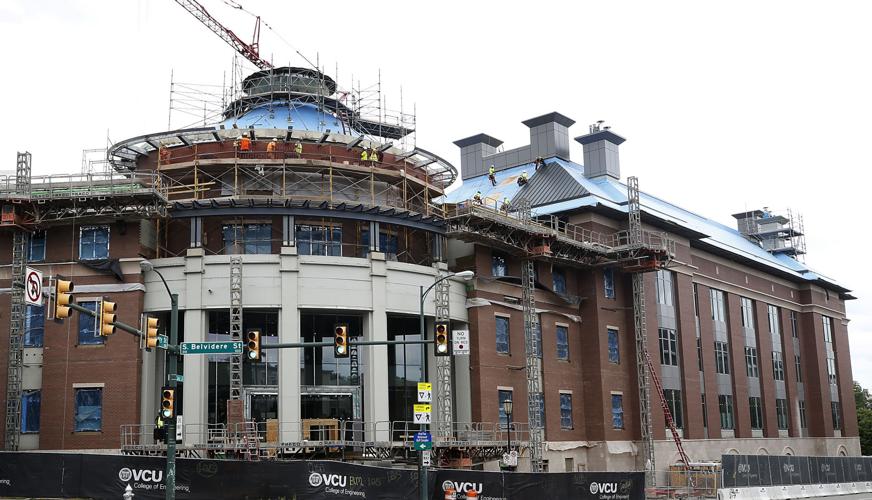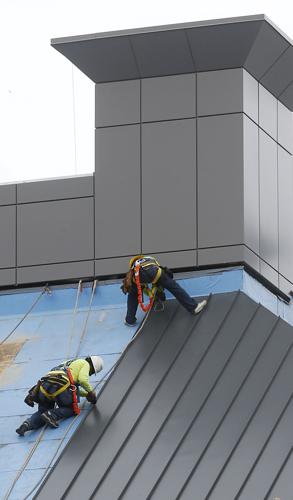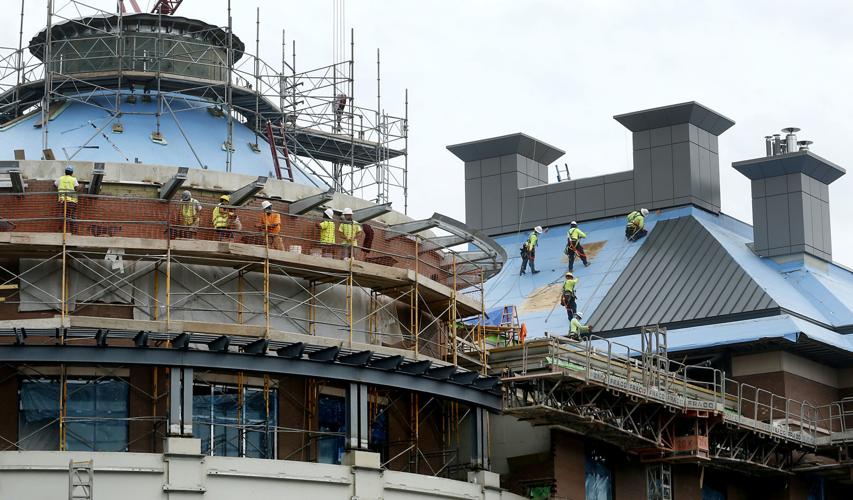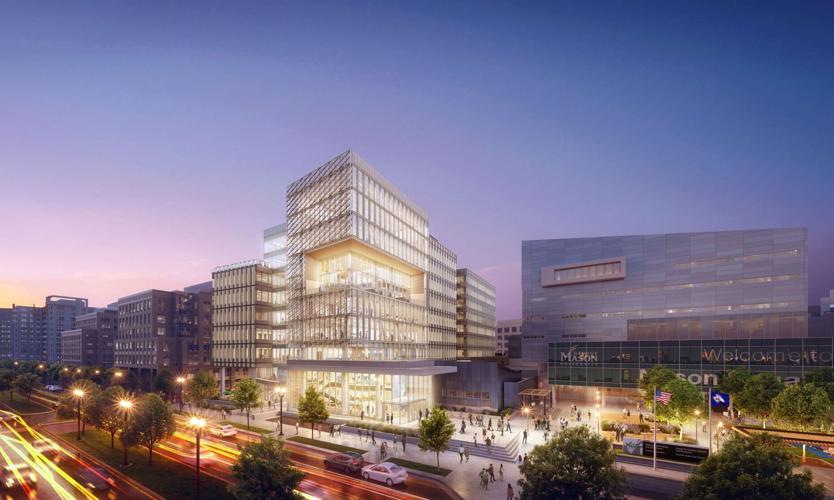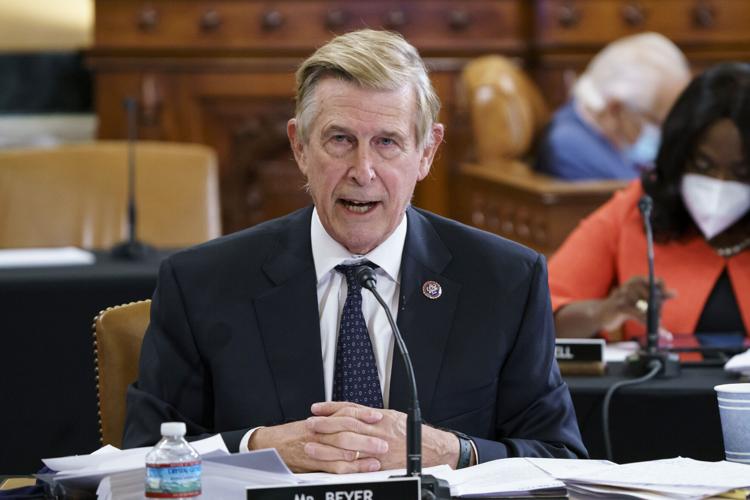ARLINGTON — Rep. Don Beyer, D-8th, knew about the importance of emerging technologies in the economy of Northern Virginia, but a visit to the fledgling George Mason University Institute for Digital InnovAtion three years ago showed him how much he didn’t know.
So Beyer went back to school, working on a master’s degree in computer science at Mason while serving his fifth — soon to be sixth — term in the U.S. House of Representatives in a Northern Virginia district with a heavy concentration of high-tech businesses and employees.

Officials on Friday opened Fuse at Mason Square, which will be home to George Mason faculty and students as well as high-tech companies that will use the research produced there and hire many of the students who gain undergraduate and graduate degrees.
“These are the people I represent and the businesses I represent, and I just wanted to know a lot more about it,” he said Friday. “Mason fit that bill perfectly.”
People are also reading…
Beyer is still working on that degree — with seven classes down and 11 to go — but the seed that Virginia lawmakers planted with state tax dollars six years ago is bearing fruit in a gleaming high-rise building here.
Fuse at Mason Square will become home to George Mason faculty and students, but also the high-tech companies that will use the research produced there and hire many of the students who gain undergraduate and graduate degrees as part of the state’s tech talent investment pipeline.

Beyer
The congressman helped open the new center on Friday, although students will not arrive for classes until next fall.
George Mason will occupy more than half of the 345,000-square-foot building. It is owned by a private investment partner and leased to business tenants as part of Fuse, which brings together higher education, workforce training, scientific research and business applications, as well as public policymaking on emerging technologies.
“The idea behind Fuse is very simple: We want to be a beacon for innovation,” said Brian Naumick, vice president and managing director of Edgemoor Infrastructure & Real Estate, developer of the $250 million project in the Virginia Square neighborhood here, using a combination of state, philanthropic and developer funding by Mason Innovation Partners.
George Mason faculty and students will work next to high-tech businesses on most floors, making it easier for them to collaborate on research and bring it to market, whether for commercial products or public uses.
“We want faculty, students, industry and government all bumping into each other,” said Liza Wilson Durant, associate provost for strategic initiatives and community engagement at Mason.
Durant has played a pivotal role in shepherding two state initiatives to invest in high-tech research and education. The state pledged more than $1.1 billion in state funding over 20 years to boost production of undergraduate and graduate degrees in high-tech fields as part of a $1.8 billion state incentive package for Amazon in 2018 to build its East Coast headquarters in Arlington’s Crystal City neighborhood.
The tech talent package included $250 million for the $1 billion Innovation Campus that Virginia Tech is building at Potomac Yard in Alexandria and $125 million for Mason to build what is now known as Fuse at Mason Square.
Earlier that same year, the General Assembly created the Commonwealth Cyber Initiative to spur higher education research to train students for jobs in cybersecurity and other high-tech disciplines. Virginia Tech operates the hub site of the state cyber initiative, but Mason and other public research institutions, including Virginia Commonwealth University, work together in regional nodes to turn research and education into job opportunities for students.
Durant, who is also associate dean of the Mason College of Engineering and Computing, is director of the Northern Virginia node of the cyber initiative, currently housed in an adjacent building in Mason Square. She said the initiative has partnered with industry to create hundreds of internships and apprentice programs for students in tech fields, while helping two dozen cybersecurity startup companies.
“We’ve had a pretty good track record, especially in Northern Virginia,” she said.
Fuse offers hands-on opportunities for businesses and other public initiatives to learn how they can apply emerging technology in other fields — defense and national security, public health, transportation, space exploration, digital art, humanitarian aid and disaster relief.
“It’s access to the technology world for the sake of peace building,” said Charles Davidson, a research assistant professor at Mason’s Jimmy and Rosalynn Carter School for Peace and Conflict Resolution.
The mechanized robots that Xuesu Xiao, an assistant professor of computer science at Mason, demonstrated on Friday in one of the building’s laboratories could aid in responding to a disaster or delivering humanitarian relief — either with humans or substituting for them in dangerous environments.
Andre Marshall, vice president of research, innovation and economic impact at Fuse, wants academic research to create knowledge and then transfer it to private and public partners through new products and, most importantly, skilled employees.
“You shouldn’t just think about patents,” Marshall said. “You should think about hiring students.”
However, Fuse isn’t just an academic building. It’s also a public-private partnership with Edgemoor, as developer and investor, and Harrison Street, a real estate investment firm, as capital partner.
Naumick, Edgemoor’s vice president and managing director, said the building is 75% leased, including Mason, with more tenants on the way. “We just came to terms with a partner this morning during the event,” he said with a smile.
The other tenants have not been identified publicly yet, other than Wood & Iron, a restaurant on the building’s ground floor.
But George Mason President Gregory Washington expects the new building to become a catalyst for economic growth in the county and region.
“We have changed the skyline of Arlington forever!” Washington said.
PHOTOS: Construction of VCU's Engineering Research Building
VCU's Engineering Research Building is under construction on the northeast corner of West Cary and Belvidere Streets Wed., May 27, 2020.



